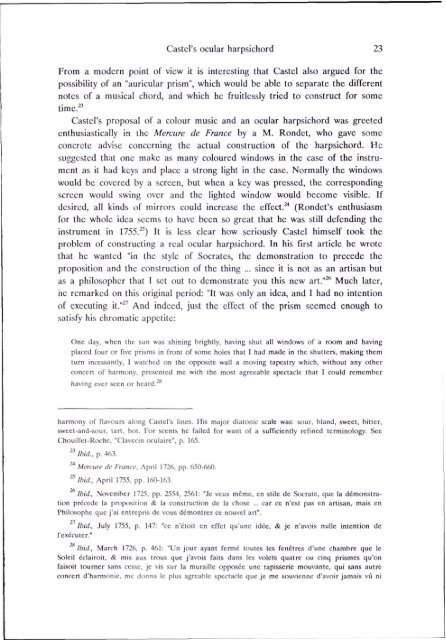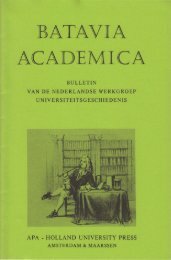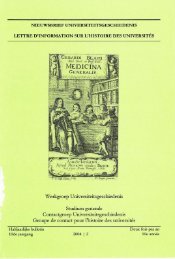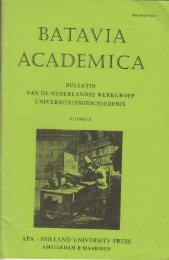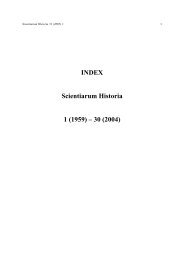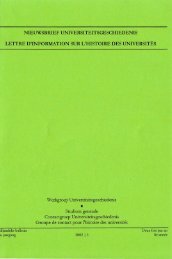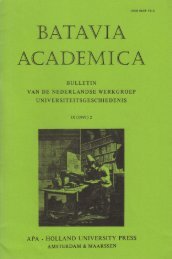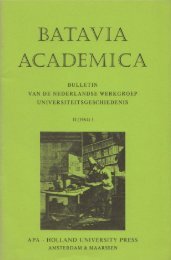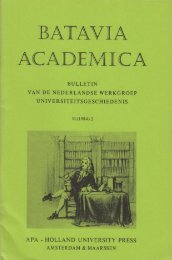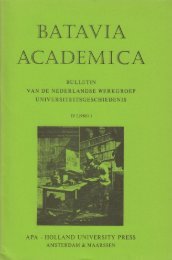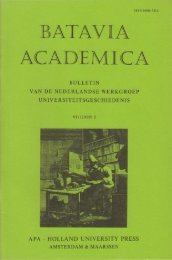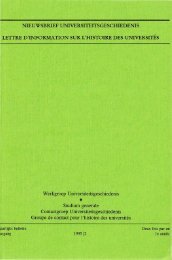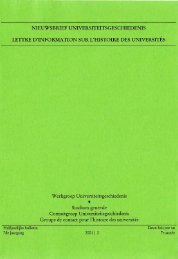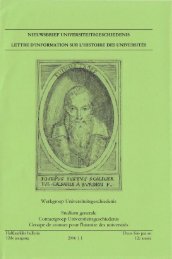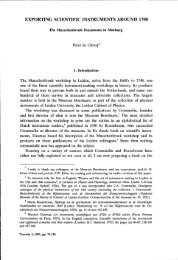the ocular harpsichord of louis-bertrand castel - Gewina
the ocular harpsichord of louis-bertrand castel - Gewina
the ocular harpsichord of louis-bertrand castel - Gewina
Create successful ePaper yourself
Turn your PDF publications into a flip-book with our unique Google optimized e-Paper software.
Castel's <strong>ocular</strong> <strong>harpsichord</strong> 23<br />
From a modern point <strong>of</strong> view it is interesting that Castel also argued for <strong>the</strong><br />
possibility <strong>of</strong> an "auricular prism", which would be able to separate <strong>the</strong> different<br />
notes <strong>of</strong> a musical chord, and which he fruitlessly tried to construct for some<br />
time.^''<br />
Castel's proposal <strong>of</strong> a colour music and an <strong>ocular</strong> <strong>harpsichord</strong> was greeted<br />
enthusiastically in <strong>the</strong> Mercure de France by a M. Rondct, who gave some<br />
concrete ad'vise concerning <strong>the</strong> actual construction <strong>of</strong> <strong>the</strong> <strong>harpsichord</strong>. He<br />
suggested that one make as many coloured windows in <strong>the</strong> case <strong>of</strong> <strong>the</strong> instrument<br />
as il had keys and place a strong light in <strong>the</strong> case. Normally <strong>the</strong> windows<br />
would be covered by a screen, but when a key was pressed, <strong>the</strong> corresponding<br />
screen would swing over and <strong>the</strong> lighted window would become visible. If<br />
desired, all kinds <strong>of</strong> mirrors could increase <strong>the</strong> effect.^ (Rondct's enthusiasm<br />
for <strong>the</strong> whole idea seems to have been so great that he was still defending <strong>the</strong><br />
instrument in 1755.^^) It is less clear how seriously Castel himself took <strong>the</strong><br />
problem <strong>of</strong> constructing a real <strong>ocular</strong> <strong>harpsichord</strong>. In his first article he wrote<br />
that he wanted "in <strong>the</strong> style <strong>of</strong> Socrates, <strong>the</strong> demonstration to precede <strong>the</strong><br />
proposition and <strong>the</strong> construction <strong>of</strong> <strong>the</strong> thing ... since it is not as an artisan but<br />
as a philosopher that I set out to demonstrate you this new art."^ Much later,<br />
he remarked on this original period: "It was only an idea, and I had no intention<br />
<strong>of</strong> executing it."" And indeed, just <strong>the</strong> effect <strong>of</strong> <strong>the</strong> prism seemed enough to<br />
satisfy his chromatic appetite:<br />
One day, when <strong>the</strong> sun was shining brightly, having shut all windows <strong>of</strong> a room and having<br />
placed four or five prisms in front <strong>of</strong> some holes that I had made in <strong>the</strong> shutters, making <strong>the</strong>m<br />
turn incessantly, I watched on <strong>the</strong> opposite wall a moving tapestry which, without any o<strong>the</strong>r<br />
concert <strong>of</strong> harmony, presented me with <strong>the</strong> most agreeable spectacle that I could remember<br />
having ever seen or heard.^<br />
harmony <strong>of</strong> flavours along Castel's lines. His major diatonic scale was: sour, bland, sweet, bitter,<br />
sweet-and-sour, tart, hot. For scents he failed for want <strong>of</strong> a sufficiently refined terminology. See<br />
Chouillet-Roche. "Clavecin oculaire", p. 165.<br />
"/ft/rf., p. 463.<br />
Mercure dc France. April 1726, pp. 650-660.<br />
^"^ Ibid., April 1755, pp. ir>0-163.<br />
//)((/., .November 1725, pp. 2554, 2561: "Je veux mcme, en stile de Socrate, que la demonstration<br />
precede la proposition & la construction de la chose ... car ce n'est pas en artisan, mais en<br />
Philosophc que j'ai entrcpris de vous dcmontrer ce nouvel art".<br />
Ibid., July 1755, p. 147: "ce n'etoit en effel qu'une idee, & je n'avois nulle intention de<br />
Texccuter."<br />
Ibid., March 1726, p. 461: "Un jour ayant ferme toutes les fenctres d'une chambre que le<br />
Soleil eclairoit. & mis aux trous que j'avois fails dans les volets quatre ou cinq prismes qu'on<br />
faisoit tourner sans cesse, je vis sur la muraille opposee une tapisserie mouvante, qui sans autre<br />
concert d'harmonic. me donna le plus agreable spectacle que je me souvienne d'avoir jamais vu ni


